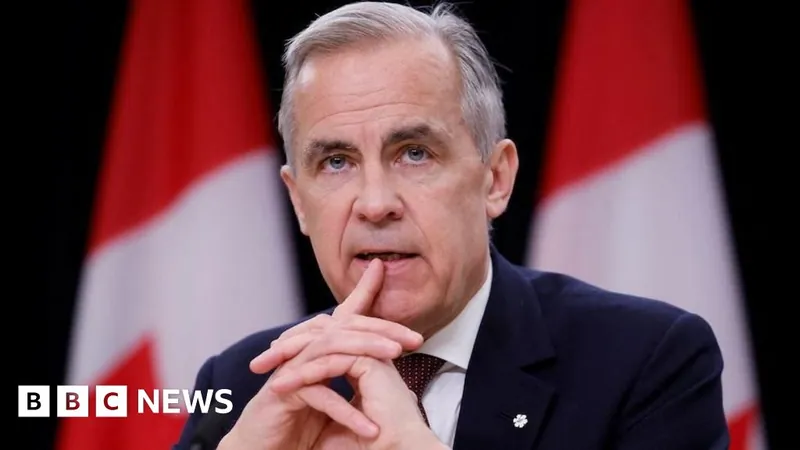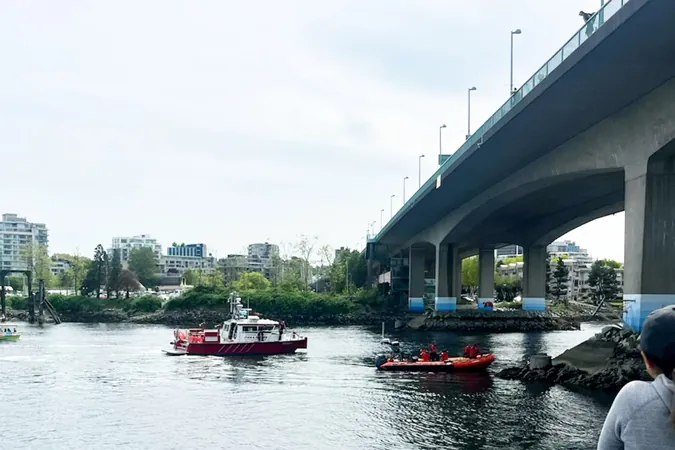
B.C. Premier Insists No Fast-Tracking of Major Projects Without First Nations' Partnership
2025-05-11
Author: Sophie
A New Era of Indigenous Partnership in B.C.
In a groundbreaking statement, Premier David Eby of British Columbia has declared that the province will not fast-track any major projects without the crucial consent and ownership of First Nations. This announcement accompanies the government’s push for controversial legislation intended to expedite key infrastructure developments, but with a notable twist: Indigenous voices will be at the forefront of these decisions.
Introducing Bill 15: A Commitment to Reconciliation
Eby’s New Democratic Party is racing to pass Bill 15, the Infrastructure Projects Act, by the end of May. This proposed law would empower the cabinet to expedite significant projects, aiming to tackle the province's economic challenges. However, Eby emphasizes that for these projects to move forward, they must incorporate Indigenous participation, stating, "For us, it’s about actual ownership by the Nation whose territory the projects are going on."
A Clear Stance on Fossil Fuels
While clean energy and mineral mining are on the agenda, the province is not extending the same welcome to fossil fuel projects. Premier Eby has made it clear that the bill will not facilitate pipelines or Liquefied Natural Gas (LNG) initiatives, distancing his government from Alberta's push for new oil and gas developments.
The Political Landscape: A Tight Struggle Ahead
The passage of Bill 15 is crucial for Eby, who must rely on every vote from his party's slim majority. However, resistance is mounting. Environmentalists and First Nations leaders oppose the bill, claiming it was introduced without adequate consultation, and both Conservative and Green parties have pledged to vote against it.
Reconciliation or Backsliding?
Eby faced backlash last week, leading to an apology to the First Nations Leadership Council after Indigenous groups voiced concerns about a lack of dialogue prior to the legislation's announcement. His government is under scrutiny as critics assert they are straying from their reconciliation commitments.
Lessons from Ontario: A Similar Path?
B.C.'s legislative challenges echo similar issues in Ontario, where Premier Doug Ford's Bill 5 faces criticism for its approach to mining approvals. Indigenous leaders in both provinces have warned of protests if legislation is perceived as neglecting their rights.
The Economic Vision: Building Together
Eby is positioning the province as a leader in clean energy and critical mineral mining, seeking to naturally align economic growth with Indigenous rights. He stated that in identifying priority projects, Indigenous involvement is non-negotiable, noting, "There are too many potential court challenges. Constitutional rights are non-negotiable."
Industry Response: A Shift Towards Collaboration
The mining sector in B.C. is already shifting toward collaboration with First Nations, as noted by Michael Goehring, CEO of the Mining Association of B.C. He insists that successful mining operations require strong partnerships with Indigenous groups and emphasizes the need for expedited permitting processes.
Looking Ahead: Promising Opportunities
With 18 proposed critical mineral mines in advanced stages, Goehring assures that each project is on a path of partnership with First Nations. The emphasis, he states, is on finding ways to expedite these developments while respecting Indigenous rights and titles. Furthermore, the province plans to unveil an equity loan program to facilitate Indigenous participation in these ventures.
A New Chapter for Indigenous Participation
As the B.C. government prepares to chart a new course, Eby is optimistic about a significant increase in Indigenous involvement in major projects. The province’s initiatives aim not only to address economic needs but to ensure that Indigenous communities are active participants in their own future.









 Brasil (PT)
Brasil (PT)
 Canada (EN)
Canada (EN)
 Chile (ES)
Chile (ES)
 Česko (CS)
Česko (CS)
 대한민국 (KO)
대한민국 (KO)
 España (ES)
España (ES)
 France (FR)
France (FR)
 Hong Kong (EN)
Hong Kong (EN)
 Italia (IT)
Italia (IT)
 日本 (JA)
日本 (JA)
 Magyarország (HU)
Magyarország (HU)
 Norge (NO)
Norge (NO)
 Polska (PL)
Polska (PL)
 Schweiz (DE)
Schweiz (DE)
 Singapore (EN)
Singapore (EN)
 Sverige (SV)
Sverige (SV)
 Suomi (FI)
Suomi (FI)
 Türkiye (TR)
Türkiye (TR)
 الإمارات العربية المتحدة (AR)
الإمارات العربية المتحدة (AR)